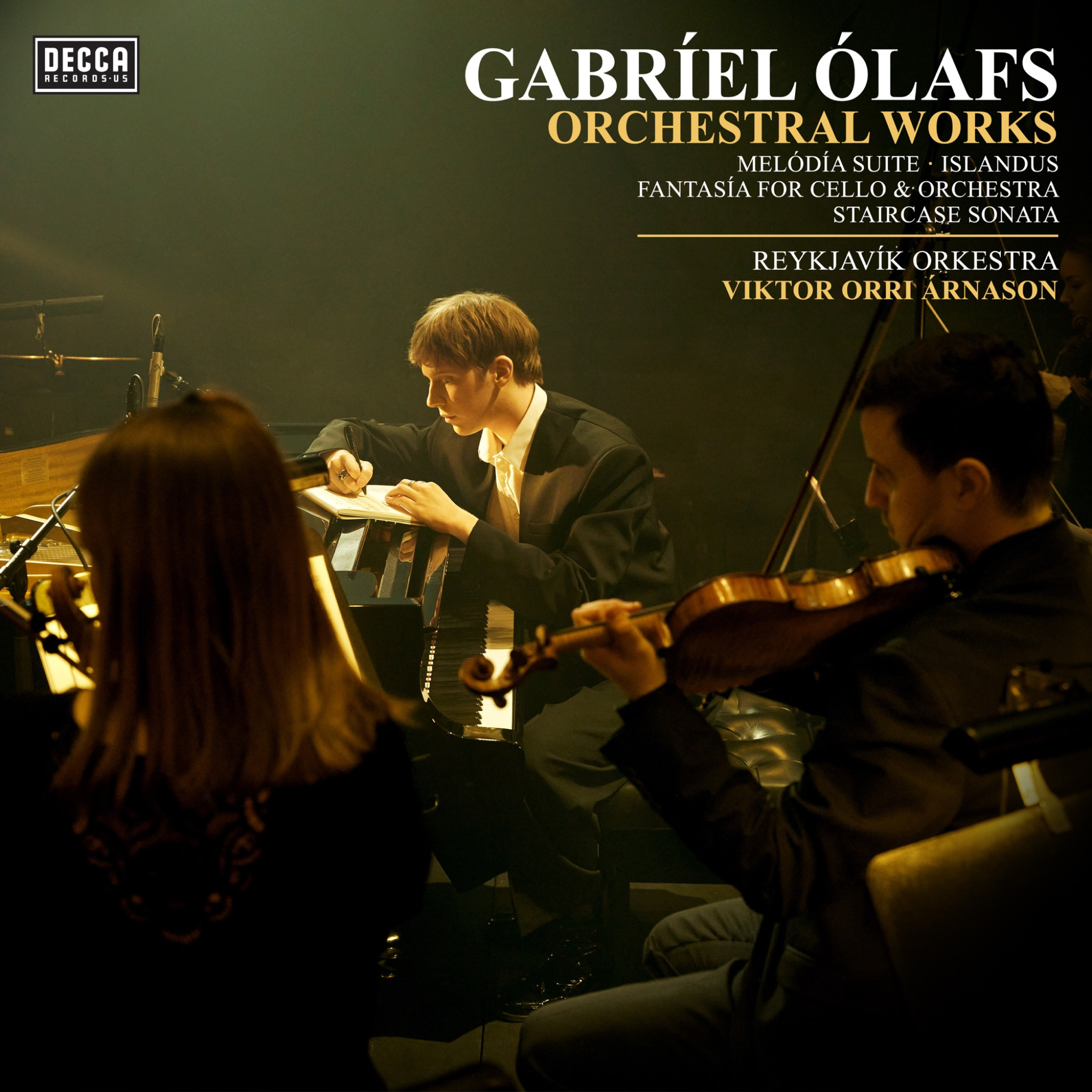Listen to the article's playlist as you read:
“It’s a recording of a chamber ensemble playing a live concert in Reykjavík’s Harpa concert hall, in November 2023,” says Gabríel Ólafs. “It was organised by The Reykjavík Orkestra and it was such a joy to work with the instrumentalists—not only are they fantastic players but they also have an open and fresh view on classical music. Conductor Viktor Orri Árnason arranged the pieces in a way that I thought was modern yet classic, bright and clear but with interesting moments, and it’s recorded and mixed by engineer Bergur Þórisson in a way that I think really stands out.”
Ólafs is explaining his latest album, Orchestral Works, from his hometown of Reykjavík in Iceland. It’s his fifth album so far, and consists of vibrant, compelling reworkings of some of his most popular compositions so far—but the truly remarkable thing is that he is only 25-years-old. Admittedly, he had a very early start, learning to play piano at the age of five before going on to study classical and jazz composition in his teens at the prestigious local FÍH music school.
“My parents are actually not musicians, they are both entrepreneurs—but they are artistic and lovers of music,” he says. “My grandfather and great-grandfather come from a tradition of Norwegian accordion playing which I feel a connection to. The piano came to me at an early age as a creative outlet. It has worked perfectly for me and it’s my favourite thing in the world.”
By 14, Ólafs had written a piece called "Absent Minded" that caught the attention of Björk’s manager, Derek Birkett, who signed him to Björk’s label, One Little Independent Records. In 2019, an album of the same name was released, including the title song—but it was another composition, entitled "Staircase Sonata", that was to become viral, clocking up more than 10 million plays on Spotify.
Clearly not one to rest on his laurels, Ólafs followed up swiftly with 2020’s Piano Works, a collection of eight solo instrumental pieces, including "Filma Solo," which was streamed more than 30 million times on Spotify. A reworked version of Absent Minded (titled Absent Minded Rework) emerged the same year, featuring contributions from Kelly Moran, Niklas Paschburg, Masayoshi Fujita and Hugar. “I still love my piece “Absent Minded” more than most from my earliest years as a composer,” comments Ólafs. “I’ve even included a new arrangement of it on Orchestral Works. I still think it’s a good melody and it’s nostalgic for me in more ways than one; the nature of it is nostalgic but it also literally reminds me of my childhood. I feel like I’ve learned a lot since but I’m still proud of it.”
In 2022, Ólafs signed with Decca Records US, who released Solon Islandus, a new direction for the composer that saw him create music inspired by the modernist poetry of Davíð Stefánsson and expand his instrumental repertoire to include choir and orchestra. This was followed by another Decca release, Lullabies for Piano and Cello, which was also inspired by his nation’s cultural history—this time an out-of-print book of ancient Viking melodies that he found in an antique bookshop. The album includes re-imaginings of tunes from the book as well as original lullabies.
“I have noticed a certain rejection of history and tradition in a lot of contemporary work from Iceland,” states the composer. “I have always been curious and inspired by the thought of interpreting traditions from various eras. I have been interested in paganism, the origins of Iceland and the Sagas since I was a kid, even though these are not of a religious nature for me. Icelandic history just seemed right for Lullabies for Piano and Cello and Solon Islandus as it’s so close to my heart..”
Ólafs’ next move, in 2023, was to co-found the Reykjavík Orkestra. Perhaps unsurprisingly for someone who counts Jóhann Jóhannsson, Ennio Morricone, Joe Hisaishi, Max Steiner, Thomas Newman and Ryuichi Sakamoto among his influences, the project was inaugurated to create orchestral music for film, TV and games. It’s located inside the city’s landmark Harpa concert hall, and has already found success by working with Deutsche Grammophon, Decca, Hans Zimmer, Netflix and the BBC.
“My friends and I thought our nice music hall in Iceland sounded great for live concerts, but there was no infrastructure for someone to approach recording acoustic or orchestral music there,” says Ólafs. “We contacted the venue and some people who believed in the idea of founding a modern orchestra and production company, and set up the first and only dedicated studio in the building. We originally called it the Reykjavík Recording Orchestra but now it’s called the Reykjavík Orkestra as the fluid ensemble of artists involved now also perform standalone works live and for recordings.”
During these impressively active few years, Ólafs has also managed to amass over 200 million Spotify streams, was described as “a young musician reshaping classical music" in Classic FM's esteemed Rising Stars list, and received the Nordic Music Biz award this year for being an “exceptional music professional under 30”. Under such extraordinary circumstances, the release of Orchestral Works—his boldest and broadest statement so far—can only cement his reputation as one of the world’s most exciting and successful young composers.
“I’ve always had the philosophy of writing what pleases me personally,” he concludes. “I think the success with my compositions on streaming platforms is testament to its enjoyability to a wide audience. In the context of new repertoire and contemporary classical that is being commissioned and performed, I am always hoping for a breath of fresh air and more space for the kind of music I tend to write naturally: tonal, melodic, structured and at times romantic. I think this kind of music can have a quality of excitement, freshness or depth if done right, which I strive for. And it shouldn't hurt that it can have a wider appeal.”


